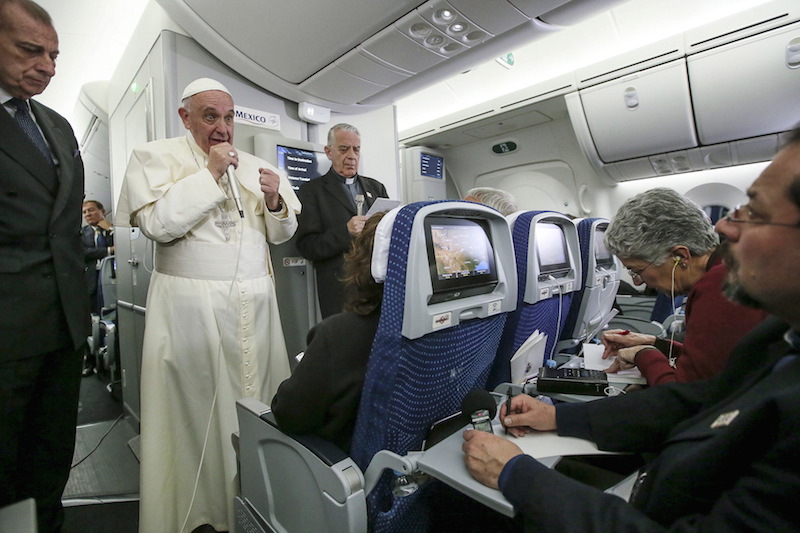
Pope Francis gestures during a meeting with the media onboard the papal plane while en route to Rome on Feb. 17, 2016. Photo courtesy REUTERS/Alessandro Di Meo/Pool
(RNS) No, it wasn’t what he said about contraception.
Actually, it isn’t clear exactly what he said about contraception. Catholic theology in this area is complex, and Pope Francis was speaking in generalities, off the cuff, as he often does during his papal plane press interviews.
He seemed to imply Thursday (Feb. 18) that using contraception could, if trying to stop the spread of Zika, be the lesser of two evils. As an apparent analogy, he cited Pope Paul VI’s views on the use of contraception by African nuns who were victims of sexual violence.
But “use of contraception” isn’t precise enough to know what the pope meant — at least not from the perspective of Catholic moral theology.
The church teaches that use of contraception, which separates sex from its natural openness to procreation — either as the end goal of one’s action (“I don’t want a pregnancy”), or as the means by which one accomplishes something else (“I don’t want a pregnancy because it will lead to X”) — is never permitted. It isn’t even permitted if it is the lesser of two evils.
Church teaching would seem to mean use of contraception in response to Zika is out. In such a case, shutting off sex’s natural openness to procreation looks like the means by which one is getting to one’s goal — not getting pregnant.
But not so fast. Perhaps the pope was relying on the principle of double effect here? This may allow him to say that what is really going on (in Catholic moral theology, this is called “the object of the act”) is stopping of transmission of the Zika virus — while the closing off of sex from producing new life is foreseen but unintended.
READ: Trump calls Pope Francis ‘disgraceful’ for questioning his faith
Double effect is invoked all the time in Catholic theology. For example, in cases of abortion, Catholic hospitals may remove a cancerous uterus with the baby inside if the death of the child is foreseen but unintended; in war one may drop a bomb that kills an innocent person as long as the death of the person is foreseen but unintended. One may also take a patient off life support — their death must be — you guessed it — foreseen but unintended.
Does the principle of double effect work in the case of using contraception to avoid transmission of a disease?
Several years ago, Pope Emeritus Benedict XVI spoke in a very similar way about the use of condoms in response to the spread of AIDS. “He wanted to kickstart a debate,” Vatican officials said.
Boy did he ever. Benedict spoke with enough generalities that it wasn’t immediately clear what, if anything, justifies the use of condoms in response to AIDS, leaving much room for debate. Francis has also spoken with enough generalities that it wasn’t immediately clear what, if anything, justifies the use of condoms in response to Zika, leaving much room for debate.
We’ve seen this before. And from a “conservative” pope, no less.
What was surprising in Francis’ remarks, however, was his incredibly strong language about abortion.
Some believe Francis has downplayed the issue and in a widely covered interview he basically said the church talks too much about it. But the very next day the pope spoke about abortion in a speech to a number of OB-GYNs in Rome, linking the practice to “widespread mentality of profit, the ‘throwaway culture,’ which has today enslaved the hearts and minds of so many.”
“Every unborn child, though unjustly condemned to be aborted, has the face of the Lord, who even before his birth, and then as soon as he was born, experienced the rejection of the world,” the pope said.
Though Francis has spoken about abortion fairly consistently, until now he has done so with something other than prophetic, fiery, aggressive language. He has been more focused on the structural issues that lead to abortion, even making forgiveness of abortion a key theme in the Jubilee Year of Mercy.
This makes it all the more surprising that he used these words onboard the papal plane flying back from Mexico:
Abortion is not the lesser of two evils. It is a crime. It is to kill someone in order to save another. This is what the Mafia does. It is a crime, an absolute evil. … Don’t confuse the evil of avoiding pregnancy by itself, with abortion.
Equating abortion with a Mafia hit? Directly calling it a crime, an absolute evil? What happened to pastoral Francis? What happened to the shepherd who always spoke with gentle, welcoming language?
Well, it turns out there have been several practices about which Francis has been anything but pastoral and gentle. In calling out the practices of modern capitalism, the Holy Father called the unfettered pursuit of wealth “the dung of the devil.” In calling out the practices of the Italian Mafia, he declared them excommunicated. In calling out the practices of curial officials in Rome, he described them as having “spiritual Alzheimer’s.”
After his most recent presser, we can add another practice to the list of those that produce red-hot Francis rhetoric: abortion as a response to the reality of disabled children.
(Charles C. Camosy is associate professor of theological and social Ethics at Fordham University)




